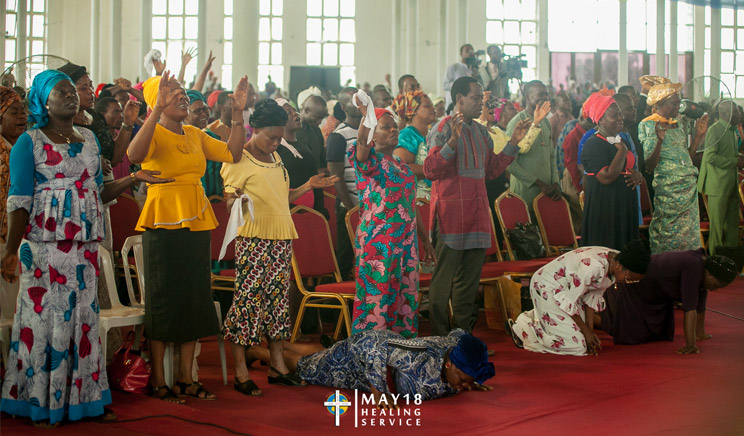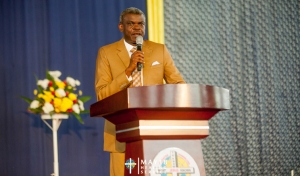Hospital and Prison Ministry holds Conference in Port Harcourt
The Hospital and Prison Visitation ministry held their annual conference from Friday 25th May 2018 to Saturday 26th May 2018 at GEWC Mile 1 Church, Port Harcourt. The conference covered talks on, the consequences of Neglecting Hospital and Prison Ministry by Pastor Ibim Alabraba; The Importance of Hospital and Prison Visitation to the Church by Pastor Ledum Vite; Effective Hospital and Prison Ministry Visitation by Pastor Dr. Nonyem E. Numbere. There was also a book review on Catch the Fish and Keep it alive.
Pastor Dr. Nonyem E. Numbere as part of the introduction into her talk on Effective Hospitals and Prisons Ministry Visitation, said the hospitals and prisons ministry consists of two ministries or departments in the Church that should ideally be independent bodies because of the vast scope. Both belong to the ministry of helps but each to a specialized group of people. More details from her talk can be found below.

Hospital and Prison Ministry (HOSPRIM) is a care giving ministry, others may say “We won’t serve at tables, we will give ourselves to the ministry of prayer and the Word” (Acts 6:4), but the HOSPRIM cannot say that. She is to care for the physical as well as the spiritual. It is a ministry of help, mercy and service to a special group of people namely: those who are sick and are in hospitals and those that are in prisons including police detention cells (Romans 12:7-8; 1 Corinthians 12:28).
Such people are often lonely, depressed and therefore need love, compassion and care. People in prison are there because they committed a crime (although there are some case of wrongful imprisonment) but people are sick not necessarily because they have done anything wrong. Ministering to both groups brings light, hope, deliverance and recovery to them. No ministry or church is complete without this department.
The Importance Hospital and Prison Ministry (HOSPRIM)
HOSPRIM is a ministry that is predicated on love and compassion. It is a way of showing love to others thus fulfilling the second part of the summary of God’s commandments as given by Jesus Christ Himself (Matthew 19:19; 22:37-39; Mark 12:31).
To buttress His point, He told the parable of the good Samaritan (Luke 10:30-37). Today, the phrase, “good Samaritan,” is used to describe someone who is good to stranger. Apostle James refers to it as “the royal law” (James 2:8)
It is a means by which believers fulfil the Great Commission to make disciples by working in a specialized category (See catch the fish and keep it alive page 19). It is therefore a tool for church growth.
How to Have an Effective Hospital and Prison Ministry
- Have a burden and give yourself to prayer and the ministry of the word of God. You need divine guidance and assistance.
- You must be fully committed to this ministry and make out time for it. This work is for people who have a compassionate heart and have the gift of help and service as mentioned above.
- Have a focus through the Vision and Mission Statements of GEWC and this department because “where there is no vision, the people perish” (Proverbs 29:18; Hosea 4:6). Vision and mission statements answer basic questions such as, “Who are we?”, “What do we value?”, “Where are we going?” Generally, organizations that have clearly defined vision and mission statements that are aligned with strategic plans perform better than those who do not.

What is a Vision Statement?
- This is a brief sentence encompassing all you want to achieve as an organization and comes first before the mission statement. It addresses the future as to what the organization wants to achieve over time. It answers the questions
- who are we or when we were established.
- Where are we headed i.e. where do we aim to be?
- It is meant to inspire or motivate members of an organization and also clearly demonstrates its goals in alignment with its organizational values and culture.
- It helps a group to
- acknowledge their past i.e. who they were when established
- identify their present i.e. who they are now
- Prepare for the future i.e. who they want to be in the next few years
- Encourages a people to focus on what is important and to better understand organizational changes and alignment of resources even when there is a change of leadership
- Guides the members to put in their best.
- Guides the mission statement and the rest of the strategic plans.
What is a Mission Statement?
The mission statement describes the purpose of the organization or group – what they do and how to get to where they want to be i.e. how to achieve their vision. While the vision statement addresses the future, the mission statement talks about the present leading to the future.
- The mission statement is what puts the feet to the vision of a church/ministry and gives it a sense of purpose and provides the motivation to quickly and clearly move the vision forward.
- It addresses four essential questions
- What do we do?
- How do we do it or how do we get there?
- What values are we bringing?

- It lists the broad goals for which an organization is formed at the same time, clearly stating its purpose, main objectives and values.
- It consists of an internal mission and an external mission. The internal mission is for the members and the external mission is the effect of the group outside itself.
- Measures the organization’s success
- Outlines the benefits of the organization.
- Have a plan as to how to carry out your mission. The bible enjoins us to make plans (Proverbs 20:18). From the modern translations you can see that counsel means consultation, deliberation, plan. Jesus Christ Himself also talked about planning (Luke 14:28-32).
Planning is basically nothing more than attempting to decide in advance what we will or will not do in the next minute, hour, days, months or years. It is an arrow that points to the future as to what we want to achieve and therefore help us to affect the future with a purpose.
Planning should begin in time because it takes time. Do not rush into programs e.g. your planning for next year’s program should not start in October this year. You should not start later than April to give room for consultations, deliberations and prayers.
Frequent reviews of your achievements are necessary in order to know whether your plans are effective. Do not hesitate to change plans and strategy where necessary.
- Recruit volunteers especially young ones by being very vocal about the importance of HOSPRIM. Many of our people are not interested because you have not been pressing enough. Also pray about it (Luke 10:1-2).
- Training is very important. Jesus spent three years training his disciples so that when He left, there were people whom the Holy Ghost would use to carry on with the work. Adopt the technique called “Training the trainer” in order to be effective down to the grassroots. HOSPRIM should be in every local church of GEWC, not just in a few churches so they can reach every hospital, police cell and prison in the vicinity of our churches. Develop a work manual using “Catch the fish and keep it alive” and teachings peculiar to hospitals or prisons visitations.
- Have faith in God and trust Him for provisions to carry out this mission and expect a bountiful harvest, no matter the difficulties that may come your way.
To wrap it up, Pastor Dr. N. E. Numbere inaugurated the National Officers and Zonal Coordinators of the Hospitals and Prisons Ministry and prayed for everyone present.
2018 Children’s Day Celebration
27th May is marked as Children’s day celebration in Nigeria. It is a time to celebrate children and the Church was not left behind in this celebration. We thanked God for the gift of children and the blessings they bring to our lives.There were parades, singing, dancing and recitations by the children to celebrate this occasion. We celebrate our children as they are heritage of the Lord: and the fruit of the womb is His reward (Psalm 127:3).
Testimonies From May 2018 Healing Service
As usual, we heard testimonies from some of our brethren of God’s goodness. One of such persons was Sis Mary of Bori zone 1 who testified how God healed her during the Easter retreat. She recounted how for thirty-two years she had been experiencing pains from her head down to her legs despite several medications and treatments. When she got home however, she struggled with immense pain to pass out urine. In course of doing that a big stone came out of her and she became well again.
Another person who testified was Sis. Abigail. She gave an interesting testimony of how she got back her phone after it was stolen in church. April healing service, was her first time at Greater Evangelism headquarters and as a first timer, she had stepped out to be welcomed with the others. She left her phone on her seat, only to realize later when she returned that it had been stolen. She called the phone and was warned by the thief never to call the phone again. Feeling sad, she spoke to a Pastor who promised to get her a new phone. However, the next day, her neighbor told her the thief had been calling in desperation to return the phone, confessing that whenever she tried using it, it felt as though she was being burnt with fire. They made contact and the phone was returned to its rightful owner.
The final testimony was from the brethren of Town church 1. They thanked God who delivered them from a ghastly auto crash, after the last healing service that would have claimed the lives of all who entered the bus they took to church.
Be Still and Know that I am God: May 2018 Healing Service
The presence of God was mighty in service this month. God’s word was brought forth though the International Director, Pastor Isaac Olori. The topic of the sermon was “Be still and know that I am God” (Psalms 46:10). He pointed out that the “I am that I am” was the One speaking here and this understanding gives credence and authority to His words. Excerpts from his sermon can be found below.
Three (3) things God Addressed
- God is addressing His children, particularly those facing one challenge or the other.
- Those who are not his children. Everyone is God’s creation, but not everyone is a child of God. Only those who have accepted Him are His children (John 1:12). The moment you realize that you cannot struggle with God, and accept Him, you become His child e.g. Saul.
- Circumstances, powers and forces warring against the children of God. When God says “be still” it means He is about to manifest Himself.
What does it mean to “Be Still”

- “Be still” has its origin in Hebrew – “Rapha” meaning to be weak/to relax/a state of lacking power. One of the things we must note is that God will not take over your battle until you cease fighting and recognize that you are limited while God is unlimited and infinite. God does not help the strong, he helps the weak. To be weak in this context means to call upon God and tell Him to help you and that you need His intervention (2 Corinthians 12:9-10). Sometimes people come to God as an option, but if you want God to identify you for a miracle, you must come to Him as the only option.
- “Be still” means to be calm, a state of tranquility, freedom from storm. A boat needs water to sail, but if that same water gets into the boat, it will sink it. Do not allow the turbulence to affect your inside. Your mind and spirit must be free from agitation and worry by casting your cares on Jesus (1 Peter 5:7). Many are going down spiritually because they have accumulated so much are within. Learn to cast your cares on the Lord.
- “Be still” means to surrender and submit to God even in our situation, acknowledging the fact that He is still in control. God never loses control. He rules over every situation and determines what happen. We must thus free ourselves from anxiety and worry and rely on God.
Why We Need To Be Still
- Deuteronomy 4:7; Psalm 145:18; Psalm 34:18. When you have a covenant with the Lord, there is a covering over you. The strong are not easily broken. If God is near you, no matter the trouble that comes, you must overcome. Part of the principle of faith is being still and trusting God for the impossible.
- God is our refuge and strength and we can access Him; He is available. Refuge talks about protection, shelter, where we turn for safety when situations are trying to overwhelm us.
How God’s Abundant Mercy Can Come
- Psalm 18:12-19. When God wants to fight, He fights an unconventional war. God manifests Himself when you come to Him and ask for help.
- Isaiah 55:7. If God will abundantly pardon the wicked, then He will abundantly show us mercy (Psalm 46:2).
In conclusion, he said, when you get to a point where you do not have enough, that is the point you should surrender. For God’s people, being still means looking to the Lord for help in great difficulties. Most of the time, the challenge is the turbulence, and as a result we tend to forget God.
Know that God is God. To know who God is, you must have a relationship with Him. When you give yourself to prayer and the study of the word, it will strengthen you and you will hear God say, “Be still; for I am God”. God will bring glory to Himself through our circumstances. It becomes a raw material in God’s hands and He visits to turn your situation around.
Finally, the Lord cannot be with you, if you are not born again. When we come into a covenant relationship with God, nothing will be impossible.
Pastor Isaac Olori Ordains Ministers and Elders in Port Harcourt
It was a joyous occasion as another batch of Ministers and Elders were ordained in Greater Evangelism World Crusade. A total of 164 Ministers and 243 Elders were successful out of about 500 candidates who had gone through the rigorous exercise of training (CUSOM), written and oral exams. Family and friends of candidates turned out in mass to witness this occasion.

Pastor Isaac Olori before ordaining each of them, gave the Ordination charge titled “The Ministerial Calling” (Hebrews 5:1 – 4; 1 Thessalonians 2:1 – 4). Below are excerpts from his sermon.
Our Christian life is first a calling to devote our life and service to God. The Ministerial Calling is then, a higher calling. It is a call to total dedication of our life, body, soul and resources to God’s service. It is beyond a title, it is rather responsibility and duty. Accepting to be ordained is saying “I am devoting my soul, body, time, energy and resources for God’s Service”.

Nature of the Calling (Hebrews 5:1 – 4)
- The calling is a High Calling: The standard of ministry remains the same. Do not be tempted to follow other ministers who have watered down God’s standard. Let your life be an example of the minister.
- You are taken from among men (Acts 14:15): The minister must remember that he is first a man, a brother or a sister. Do not be bloated with the title of your office. Do not treat the office like something you earned, it is only by grace so be humble.
- Appointed for men: Always remember that you are appointed to serve men. You were not appointed for people to serve you. You are a gift to the Church (Ephesians 4:8). Gifts do not serve themselves neither do they exist to be served. Ministering to men is one of the crucial responsibilities of ministers. Part of your judgement by God will be on how you served men.
- Your responsibility after ordination is primarily spiritual before physical (1 Corinthians 4:1). Be a manager of spiritual and divine truths and deliver it to people.
- Your sacrifice is prayer, worship, time and money (Hebrews 5:2). You must imbibe the character of compassion for those who are ignorant and going astray. Compassion is the force that will propel you to go out of your way to do things for your people. Stand in the gap for your people and pray with the heart of compassion. You are being empowered to be an agent of compassion.
- You are subject to weakness (Hebrews 5:3). Ordination does not make you a super human overnight therefore, your personal devotion must not be neglected. As you call others to devotion, do not lose your devotion because if you do, you have nothing to offer. Never allow your being busy for God to rob you of your time with God.

Focus on Results
- Produce fruits (2 Thessalonians 2:1). There should be evidence of positive impact on people’s lives. Results do not just happen, it takes determined effort and focus. Results come with a price.
- The calling carries both burden and sacrifice. The calling most times demands great sacrifice and suffering. You are therefore entering the ministry of burden bearing. When you serve, honor will come but the pathway is burden and shame (1 Thessalonians 2:2)
- Beware of Apostasy (1 Thessalonians 2:3). Out there are so messages that might be popular but not founded on the truth (2 Timothy 1:13, Titus 1:13). There is sound word and sound faith. Sound faith is a product of sound teachings/word. Fight ungodliness. Beware of the ministry of uncleanliness and deceit. As a minister, you should be ready to stand against false teachings and doctrines of devils.

- Seek God’s approval (2 Thessalonians 2:4). There are times men might approve you but God might disapprove. Always seek God’s approval.
- Ministry is a trust (2 Thessalonians 2:4). The gospel is being put into your hands to protect the gospel. It is a sacred trust and every trust calls for faithfulness and accountability (1 Corinthians 4:1,2)
- God tries or tests our heart (2 Thessalonians 2:4). Be conscious of the fact, not only our works will be tried but our hearts too (2 Chronicles 25:2)
In conclusion, reading 2 Timothy 2:2, Pastor Isaac Olori prayed that the grace of ordination should flow and affect the lives of all candidates who will be qualified, can be entrusted with the gospel and also raise “Timothys”. He charged them to go and make disciples.
After the charge, the ordination procedure began with the administration of pledges, ordination and presentation of ordination certificates to the newly ordained ministers and elders.












